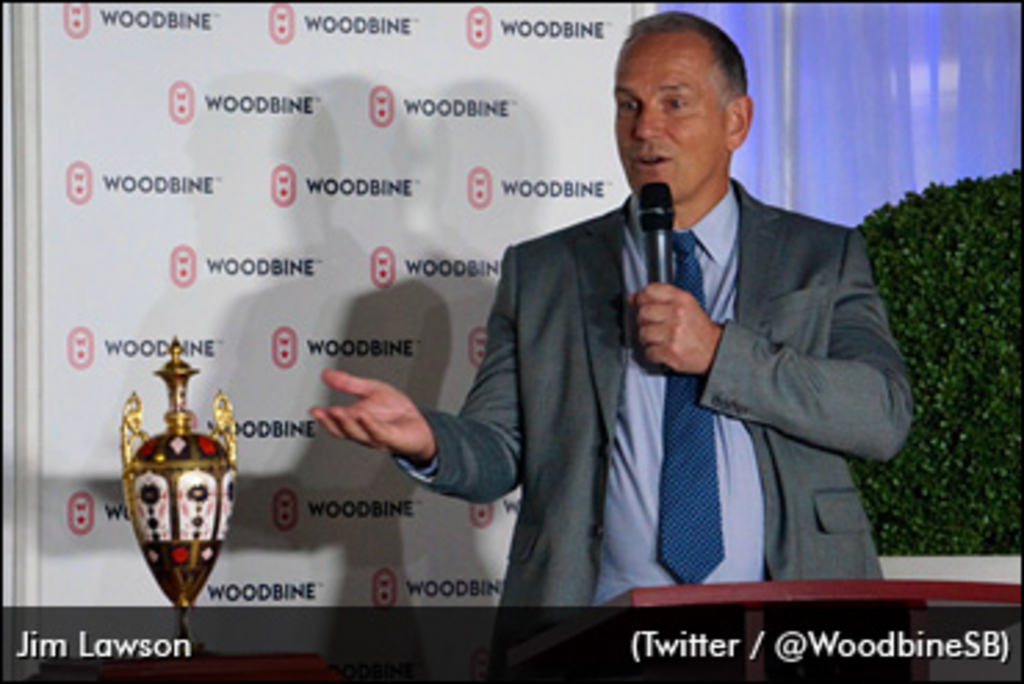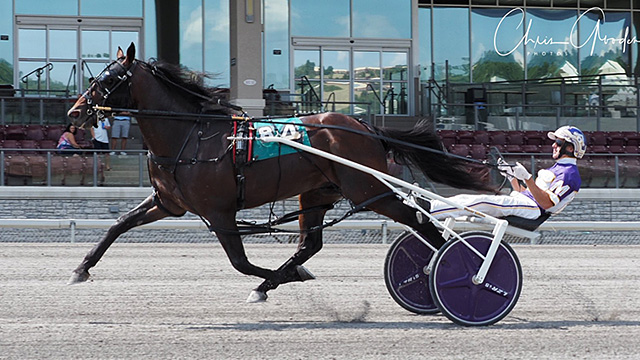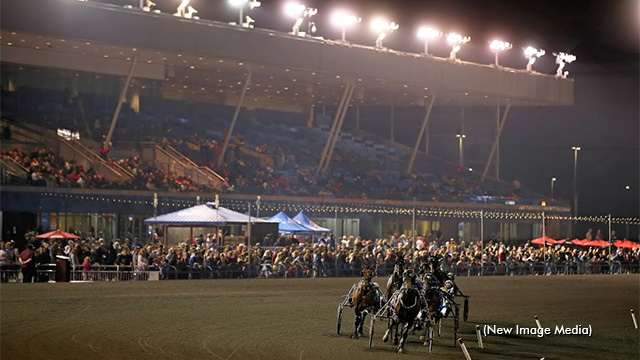
Woodbine Entertainment CEO Jim Lawson is resolute is his drive to make both Woodbine Racetrack and Woodbine Mohawk Park world-class racing destinations with world-class horse racing. In order for that to happen, however, the tracks need to safely host the world's best.
Lawson told Trot Insider on Saturday that he and his team at Woodbine have developed protocols and guidelines to bring in participants to compete safely in events like the 2020 Pepsi North America Cup and Mohawk Million, and he's hopeful that government will work with Canada's biggest racetrack operator in the not-to-distant future in order for these events to reach their full potential.
Lawson has commented publicly on this issue in the past, and some participants have interpreted those comments as a slight against the Canadian-based drivers, jockeys and trainers that regularly compete in Rexdale and Campbellville. Those sentiments, said Lawson, couldn't be further from the truth.
"Some of my comments have been interpreted...'we have drivers here and trainers here and don't you think, Lawson, that the people are good here?' And my premise was 'absolutely, I think we have the best drivers' colony and the best trainers potentially in the world here' so that is not at all what I'm saying," Lawson told Trot Insider. "It's fine at times for horses to come up and to be put in other's care but my point, for these big events, my goal at Mohawk and my goal at Woodbine and part of the strategic plan at Mohawk is to make Mohawk the #1 harness racing destination in the world. And I think it's doable. I think with the type of nights that we've put on we have more than $2 million in purses [those nights] and we're doing that to showcase Mohawk and everything we've worked towards.
"We want the best horses in the world to come to those races. That's understandable. And if you own a star horse ... these horses are worth millions of dollars. [Trainers] don't want to ship animals up that are worth millions of dollars -- especially the studdish ones, and these three-year-old colts for the North America Cup would fall into that category -- they have idiosyncrasies, they need to be handled in a certain way. You'd have to think twice if you owned a multi-million-dollar animal about sending them up under someone else's care. That goes firstly to the trainers, and potentially to the grooms, and ultimately when there's so much value on the line you probably want your own driver or jockey that you're used to."
The statistics tell the tale: Canadian trainers regularly compete in and win harness racing's biggest events, and there's no denying that fact. Statistics aside, relinquishing control of a prized pupil is much easier said than done. Trainer Brett Pelling told Trot Insider in March that if he couldn't cross the border with newly-minted world champion Papi Rob Hanover that the horse would not race in the 2020 Pepsi North America Cup.

"I know one thing that won't happen: if they let horses into Canada but won’t let the people go then he will not be going to Canada, he will not go there without me and that’s just the way it is," said Pelling as the industry and the world started dealing with the COVID-19 pandemic. "I’m not going to spend months getting him ready to turn around and let him out of my sight for three weeks."
It's this kind of mindset that Lawson understands both from the participant side and from the business side.
"My point really is, we're running a world-class sport at Mohawk and at Woodbine, we're putting on world-class events, I think we've earned -- as an industry -- the Ontario racing industry has earned a reputation that we have developed protocols, we issued a 35-page book of safety procedures, we've been so careful and cautious every step of the way. Even this weekend, people are allowed back in Halton as part of Phase 3 and we are -- even though we've planned this for weeks -- we're taking the very cautious steps to work with the health authorities in Halton, working with the municipality, making sure we're doing everything that we should be doing. We're not loose, we're very careful, we're very cautious and as an industry and the provincial government has let us go ahead. And it's hard to say 'go ahead, you're a world-class sport', and not let us run world-class events with, again, the fact that safety comes first, protocols come first, we have to do it right. We get that. We have developed, and we're now in a stage of presenting [to government]. We've been adopting and seeing what's going on in terms of bubbles and the experience with the Blue Jays and what's going on with hockey and basketball and soccer and we have been watching carefully and talking to people and we feel we can develop protocols and procedures that will satisfy government. And they need to treat us -- horse racing, harness racing -- just like any other sport and not make subjective determinations that one sport may be more important to others."
"We have developed these world-class events and put a lot of money into it, and if you were in my shoes you'd want the best horses to show up when you're offering $2 million in purses. It's not a comment whatsoever on the quality of our local drivers or local trainers. It's a fact that if you owned multi-million-dollar animals you want to look after them...and if I owned a multi-million-dollar animal, I'm not so sure I'd want them in someone else's hands if there's a lot of money at stake; I'd probably want my driver or jockey too. If we can present to the government safety procedures and bubble-like protocols, then these people should be recognized as being able to participate just like in any other sport."
Clearly there is concern regarding current participant safety and allowing those from outside the present protocols access to Canadian facilities. These concerns are not lost on Lawson: they're fully shared. But his concerns also encompass overarching issues with border access and immigration.
"We're not loose, we're not talking about back and forth and opening up the economy. As a sport, we've earned it more than anyone else because we've been doing it now -- we opened up on June 5 -- for two months without incident and we've been careful and, I'll put it this way, we have the credibility to do this right...on August 29 and for other events. And we need to be recognized and worked with, and open that dialogue with government -- which we're hoping to do.
"Leaving COVID aside, in the normal environment, we have trouble getting people across the border and getting grooms across the border and it's very frustrating for me as an executive in this sport, to see that we're treated somewhat differently than others."
While many observers will look to the recent decision that sent the Toronto Blue Jays to play in Buffalo, N.Y., Lawson quickly pointed out that Woodbine's proposal isn't like that of the MLB team.
"We get that and we've been watching. We understand that they don't want people going back and forth like that, but that's not what we're contemplating. We're contemplating making sure that on an individual basis -- we're not talking big numbers -- we have procedures that will ensure they're in a bubble-like environment and make sure they're isolated. It will be our responsibility," noted Lawson. "What we've done to protect our sport and sustain our sport has worked and we've earned the credibility. I would say we've been a leader in terms of how we've done things. Since March 15 we've had 600, 700, 800, 900 people going into our backstretch every day [at Woodbine Racetrack] without incident. There have been a couple of tangential incidents, but they've been managed and they haven't originated in our backstretch.

"We're not contemplating large groups of numbers coming back and forth and bringing people in en masse, we're talking about a very structured and isolated environment on an individual basis that people would have to adhere to, and not exposing people. We've already achieved physical distancing protocols. If you're driving up from Buffalo, you're going directly to Mohawk, you're there for 24 hours, maybe not even, in this country and you're observing isolation protocols the whole time...I'm getting into the details but all I'm saying is we deserve [the chance to have] these people to come in as long as we as a sport can show that we're creating a bubble-like environment for these people."
Lawson also stated that these protocols would most assuredly increase exposure and handle, thus helping sustain the industry.
"Another factor is that 35 percent of our wagering is in the U.S. -- especially premier events -- and in order to sustain a local racing program and help local horsepeople Woodbine Entertainment is under enormous pressure to increase wagering, particularly on our big events which is how we attract and grow our customer base -- the growth in our Standardbred wagering has been primarily in the U.S," noted Lawson. "It is important to understand our business model before passing judgement that somehow we are not supporting our local horsepeople by encouraging the top horses to race at Woodbine Mohawk Park."
While these discussions and presentations have yet to take place with government, Lawson is fully aware that time is of the essence and he's hopeful these talks are imminent and favourable.
"As a sport, we deserve the same sort of discussion and not a subjective determination that horse racing doesn't deserve a seat at the table to have this discussion," said Lawson. "We're working on it. Over the last two to three weeks we've not only developed our protocols and procedures, but we've also adjusted them to make sure we're reacting. I'm hoping and confident that we'll get there because I think our case is so strong and we've earned the credibility."

